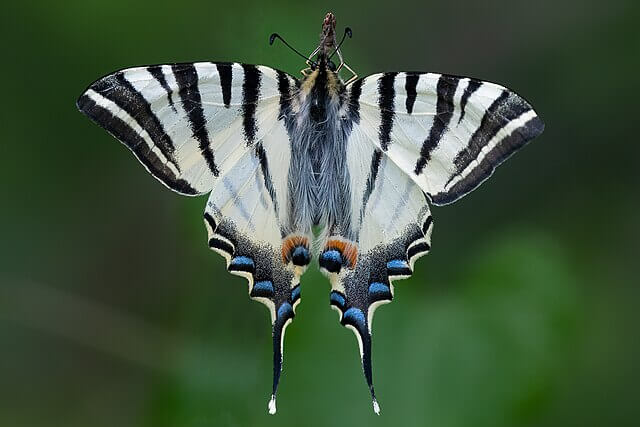
The swallowtail, Britain’s largest and among its rarest butterflies, faced its most challenging summer on record.
Confined to the Broads in East Anglia due to its caterpillar’s exclusive food source, the species now breeds in only 16 locations.
This iconic butterfly is just one of many freshwater species imperilled by the effects of global heating on Britain’s smallest, yet most biodiverse, national park.
The Broads, home to over 11,000 species, including 1,500 priority conservation species, faces threats from summer droughts, sea-level rise, and prolonged winter floods. Saltwater intrusion into freshwater habitats and inundation of marshlands pose grave risks to rare species, including the swallowtail.
Conservation scientists express concern that the swallowtail population may dwindle further due to prolonged submersion of its chrysalises during winter floods. Typically overwintering attached to reed stems near water, the chrysalis can endure brief periods underwater. However, extensive flooding since October has jeopardised their survival.
Mark Collins, chair of the Swallowtail and Birdwing Butterfly Trust, said: “It’s very concerning. The swallowtail is a bellwether for what’s going on. There will be hundreds of species with similar tales of woe but we don’t know the detail.
“In the summer, saltwater is coming into the Broads because there is not enough freshwater falling as rain to keep it out. In winter, there is so much freshwater it can’t get away and so we’ve got flooding.”
Data from the UK Butterfly Monitoring Scheme reveals a decline in swallowtail sightings, with only 81 counted in 2023 compared to 138 the previous year and 210 in 2020. Such a decline is unprecedented in nearly half a century of scientific recording, indicating a critical situation for this iconic species.
The Broads’ biodiversity hotspot faces numerous challenges, including the survival of essential flora like milk parsley, upon which swallowtail caterpillars rely. Most sites where milk parsley grows and swallowtails breed are vulnerable, situated at or below sea level. While a fungal wilt outbreak in 2021 threatened the plant, there’s relief that the pathogen hasn’t spread further.
In response to these challenges, the Royal Society for the Protection of Birds (RSPB) seeks permission to propagate additional milk parsley and plant them in elevated, wetland locations less prone to saltwater intrusion or floods.
Ben Lewis, RSPB warden for Sutton Fen in Norfolk, which has a bigger swallowtail population than any other site, said 2022 was the driest year on record on the reserve and 2023 was the wettest. “It’s quite unbelievable. Unfortunately, with climatic changes this might be the boom and bust we have to get used to,” he said.
Innovative strategies, such as cutting fen to encourage milk parsley growth and creating species-rich wetlands, show promise but vary in effectiveness across reserves.
Lewis added: “We’re collecting as much data as we can on locations and numbers of milk parsley plants and the health of the plants and referring back to the management practices in each area.
“Our key concern is ensuring we are managing our reserves with milk parsley in mind. But we can’t manage all the reserves for milk parsley or we’d lose other important fen flora.
“I’d like to see all the conservation bodies coming together to try to work it out.”
At Hickling national nature reserve, Norfolk Wildlife Trust has shifted flood banks back to create more species-rich wetlands in front of them but John Blackburn, the warden, said rising water levels in the Broads driven by the climate crisis were inundating new marshland up to 10 years ahead of forecasts.
“We’re always looking at ways of adaptation to find wetland habitat more wiggle room because it’s been hemmed in by flood banks,” said Blackburn.
“But my big concern this winter is how long the swallowtail chrysalises can cope with inundation.”
Despite efforts, rising water levels driven by climate change are outpacing conservation measures. Residents affected by flooding advocate for higher flood banks and increased river dredging. However, conservationists caution against such measures, which could exacerbate saltwater intrusion and disrupt ecosystems further.
According to Collins, winter flooding could be alleviated if estuaries and washes were recreated farther downstream, allowing large quantities of flood and tidal surge water to be naturally stored there.
Winter floods in the upper reaches of some parts of the Broads could be pumped along new channels and out to sea just a few miles away, he said.
Yet, implementing these solutions requires significant investment—a challenge compounded by cuts in funding for the Broads Authority, which manages the national park.
Collins said: “We’re not recognising sufficiently the Broads national park’s ecosystem services to flood management, biodiversity conservation and carbon sequestration, not to mention wellbeing for its near 8 million annual visitors – it is a much underrated public benefit.
“If we’re going to protect the Broads as one of Britain’s most biodiverse and important nature areas, there should be pressure on Defra to greatly increase the funding for this magnificent wetland.”
——————————————————————————
At Natural World Fund, we are passionate about stopping the decline in our wildlife.
The decline in our wildlife is shocking and frightening. Without much more support, many of the animals we know and love will continue in their decline towards extinction.
When you help to restore a patch of degraded land through rewilding to forests, meadows, or wetlands, you have a massive impact on the biodiversity at a local level. You give animals a home and food that they otherwise would not have had, and it has a positive snowball effect on the food chain.
We are convinced that this is much better for the UK than growing lots of fast-growing coniferous trees, solely to remove carbon, that don’t actually help our animals to thrive.
This is why we stand for restoring nature in the UK through responsible rewilding. For us, it is the right thing to do. Let’s do what’s right for nature!
Donate today at https://naturalworldfund.com/ and join in the solution!

